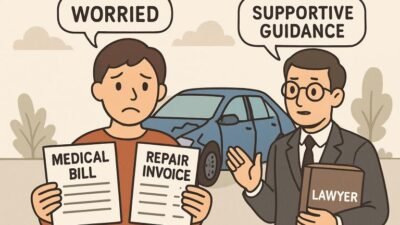Key Takeaways
- Accurate, thorough records significantly increase the strength of your Lemon Law claim. Meticulous documentation can demonstrate a pattern of recurring defects, making it harder for manufacturers to dispute your case.
- Organize all documentation related to repairs, communications, and symptoms. Having a sensible structure allows you and any legal counsel to quickly reference evidence as needed.
- Photographic and video evidence can provide undeniable proof of persistent defects. This type of documentation conveys issues that might not be fully reflected in written reports or invoices.
- Legal professionals can help you maximize the impact of your documentation, spot gaps in your records, and guide you through the complexities of Lemon Law claims.
When you purchase a new vehicle, you expect reliability and peace of mind. However, if your new car starts showing recurring issues, knowing how to document these problems thoroughly can make all the difference between securing a legal resolution and facing ongoing stress and inconvenience. Meticulous record-keeping serves as the foundation of a compelling Lemon Law claim, ensuring that all evidence is accounted for if you decide to pursue further action. If you’re experiencing persistent car defects, reaching out to a South Dakota lemon law attorney early in this process can help you clarify your rights and obligations and improve your chances of a successful outcome. Lawyers familiar with lemon law cases can help guide your documentation efforts and ensure you meet important legal requirements.
Taking a systematic approach to documenting vehicle defects not only strengthens your case but can also make later interactions with legal professionals, manufacturers, or courts more efficient and effective. Whether you’re facing serious safety issues, unpredictable performance problems, or repeated minor malfunctions, proper documentation builds a clear, detailed record that’s essential for demonstrating your vehicle’s continued unreliability. The clearer your evidence, the more likely you are to substantiate claims of persistent defects and inadequate repairs under warranty.
Understanding Lemon Laws
Lemon Laws protect consumers from vehicles that repeatedly fail to meet reasonable quality or safety standards. They require a substantial defect to persist after a reasonable number of attempts by the manufacturer or authorized repair facility. Each state has its own specific criteria, so understanding the specifics is crucial before filing a claim. For example, South Dakota’s Lemon Law outlines steps for owners whose vehicles experience ongoing issues while under warranty. If the defect remains unresolved after a reasonable number of attempts, the owner may be entitled to a new replacement vehicle or a refund of the purchase price.
Seeking early legal advice can ensure you’re not overlooking crucial requirements or missing documentation deadlines, which could otherwise weaken your claim. Stay proactive and up to date with your state’s consumer protections by consulting government sources such as the Federal Trade Commission’s warranty law guide. Having a solid grasp of both federal and state policies will empower you to assert your rights effectively.
Essential Documentation for Your Case
Effective documentation is crucial in demonstrating that your vehicle’s defect persists and remains unresolved despite reasonable repair efforts. Below are the most important categories of evidence you should consistently collect and organize to give your claim the strongest possible foundation and leave little doubt regarding your vehicle’s condition:
- Repair Orders and Invoices
Every time your vehicle is taken in for repairs, a repair order or invoice should be generated. Always insist that the dealer or service provider include these details on each document:
- Date and mileage at the time of service, which helps build a timeline of the problem’s persistence
- A clear, specific description of the issue you reported, avoiding vague language
- All work performed, including diagnostic procedures and parts replaced or adjusted
- Total number of days the vehicle was out of your possession for each repair visit
These documents together form a chronological history that establishes both the recurrence and the severity of the vehicle’s issues. In many Lemon Law cases, this written record is reviewed by courts or arbitration boards to determine whether a “reasonable number” of repair attempts has been made and if the manufacturer complied with warranty obligations.
- Communication Records
Keeping a thorough log of every interaction with a dealership or manufacturer can be critical. Consider compiling:
- Written correspondence, such as emails, letters, or service request confirmations
- Summaries of phone calls, including date, time, names of participants, and key points discussed
- Brief notes from in-person discussions with service advisors, managers, or manufacturer representatives
Documenting your attempts to seek a resolution not only shows your persistence but also demonstrates that the manufacturer had ample opportunity to correct the defect. This type of record can be especially important if your case proceeds to a dispute resolution process, arbitration, or court.
- Visual Evidence
Photos and videos are valuable, as they provide visual proof of persistent or unusual problems. Capture images or footage that highlight:
- Dashboard warning lights, malfunction messages, or other abnormal displays
- Visible defects or affected components, such as leaks, cracks, or electrical malfunctions
- Video of intermittent or performance-related issues that written documentation may not fully capture
Make sure that all photo and video files are time-stamped and clearly labeled for future reference. Visual evidence can bolster your claim, especially when issues are hard to reproduce during service appointments or when paper records alone do not fully illustrate the problem’s impact.
- Personal Logs
Maintaining a personal diary or log can help fill in important gaps left by official documents, particularly when dealing with intermittent or unpredictable defects. Log details such as:
- Every time the defect appears, with the corresponding date, time, and driving conditions
- A thorough description of the symptoms or effects you observe
- The impact on your vehicle’s safety, convenience, or your ability to use it in daily life
Personal logs add a layer of first-hand observation, offering context that official service records might omit, and help illustrate how the defect affects your experience as an owner and consumer.
Organizing Your Documentation
Proper organization helps support your claim and minimizes the risk of misplaced or overlooked evidence during mediation or a court review. Here are practical steps to keep your documentation securely accessible:
- Create a central folder—Dedicate a folder, either digital or hardcopy, solely to your Lemon Law case. Keep all relevant records, receipts, emails, photos, and logs together for easy reference.
- Sort chronologically—Arrange all documents in a sequence based on repair dates, communications, or incident dates. This approach outlines a clear and indisputable timeline for reviewers.
- Backup copies—Regularly scan and save all paper documents to a computer, cloud storage, or external drive. Having duplicate copies protects you against accidental loss or damage to your original records.
If you need to submit information to your attorney, state agency, or a third-party mediator, a well-organized file ensures that the process is as efficient and effective as possible, reducing delays and confusion.
Seeking Professional Assistance
If your efforts to address the defect through the dealer or manufacturer are unsuccessful, consulting a legal professional who specializes in Lemon Law cases is a wise next step. These attorneys know how to evaluate your documentation, identify any additional evidence that may be needed, and advocate on your behalf with the manufacturer or through the legal system. They are particularly valuable if your issue involves technical problems, unclear records, or if you encounter pushback from the manufacturer about whether your vehicle qualifies under the law. Selecting an experienced attorney can dramatically increase your odds of achieving a fair resolution, as they are familiar with local regulations, important deadlines, and effective legal strategies for Lemon Law cases. Representation ensures that your claim is presented as strongly as possible.
Conclusion
Consistent, detailed documentation is the cornerstone of any strong Lemon Law claim. By proactively recording every repair attempt, communication, piece of visual evidence, and personal observation, you place yourself in the best possible position to advocate for your rights and pursue a suitable remedy with confidence. Well-organized records not only streamline the legal process but also give you leverage should disputes arise. Refer to reputable sources, such as Consumer Reports, for additional tips and consumer protection guidance as you work through your case. Stay committed to thorough documentation, and you’ll significantly improve your chances of a favorable result under the law.



